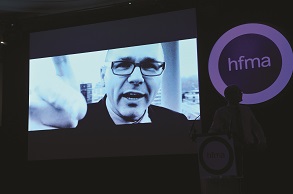Comment / The NHS rocks!
If January was all about the extreme demands being placed on the NHS, then February was dominated by the financial impacts of those winter pressures. Of the quarter 3 figures for commissioners and providers in England, it was without doubt the provider numbers that grabbed the headlines.
Last month, I reflected on the need to exit 2016/17 in the best possible financial shape. And with the Q3 report documenting a £238m deterioration in the sector’s financial performance in the third quarter alone, this challenge looks tougher and tougher.

How might the chancellor, Philip Hammond, react as he prepares his 8 March Budget? We should probably not expect any major changes of direction. It is widely expected that the task facing the NHS finance community and the service in general in the near term will remain fundamentally unchanged.
That means delivering this year as close to the plans that we individually and collectively signed up to, in order to create the best possible platform upon which to start next year.
Yes, this is as obvious as it is clear, but this year the necessity for each of us to ‘do what we said we’d do’ feels to me to be on an escalated scale of importance.
It is hard not to see the NHS – and social care – on the cusp of a landmark decision as we enter the next political cycle – for politicians and the public. Either it needs a strong reaffirmation, with the appropriate funding to take account of demanding but realistic transformation and productivity expectations, or the signal of a new direction.
It can be tough working in an NHS finance environment when the mood music is so negative. National media coverage of the financial position was, inevitably, overwhelmingly negative.
However, there were positive angles if you were prepared to look. Higher levels of cost improvement programme savings, reductions on agency staff spend and reductions in pay costs per weighted activity unit, suggesting higher productivity. Delivered in the face of rising demand and what NHS Improvement recognises has been ‘one of the toughest winters on record’, these may be seen as significant achievements.
As I make my way round our 13 branches, I will be reminding colleagues to celebrate the great work of our teams in supporting the growing demand for frontline care.
Amid the negativity in the media, we should also remind ourselves how valued our services are by those who most depend on them.
A letter to my trust’s local newspaper recounted one woman’s experience of the NHS when her husband took very ill. She praised the 999 service operator and the ‘brilliant, professional, calm and reassuring’ paramedics who responded. ‘Within half an hour, we were in A&E. The treatment my husband received was top notch, so much care and kindness.
‘Every single member of staff was professional, positive, caring and patient. My husband is home safe now,’ she wrote. ‘We are privileged indeed to have such first-class facilities. The NHS rocks!’
All our services will have earned similar public reactions and it is important that we keep sight of this. Our own role, providing support to the frontline, is just as vital in ensuring we can continue to deliver these important services in as streamlined a way as possible while also planning for the most effective service in the future.
Everyone counts. And right now, I’ll bet that someone is counting on you.
Contact the president on [email protected]
Related content
We are excited to bring you a fun packed Eastern Branch Conference in 2025 over three days.
This event is for those that will benefit from an overview of costing in the NHS or those new to costing and will cover why we cost and the processes.